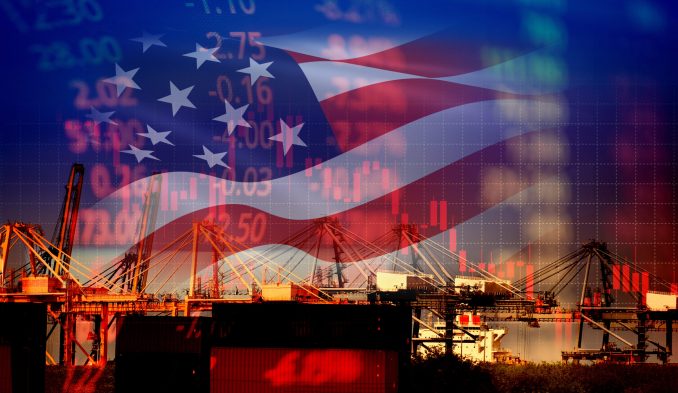ITA Engages in Commercial Diplomacy to push U.S. Global Trade
The International Trade Administration, part of the Department of Commerce, engages in commercial diplomacy promoting U.S. exports, attracting inbound investment, protecting industry competitiveness, critical U.S. technologies, supply chains, etc. besides defending U.S. industries against unfair trade.
Read also: US Trade Activity shows Resilience Amid Challenging Global Conditions
Arun Venkataraman, Assistant Secretary of Commerce for Global Markets and the Director General of the U.S. and foreign commercial service at the Department of Commerce, highlighted the U.S. export potential at the recent New York World Trade Week (NYWTW) held in New York, supported by a number of trade groups and other organizations, including the World Trade Centers Association (WTCA), the Port Authority of New York & New Jersey (PNYNJ), the New York District Export Council (NYDEC), etc.
At the NYWTW, Venkataraman pointed out that New York was one of the top five biggest exporting states in the United States. “The ITA has two offices in New York, but the ITA team has over 2,300 trade and business experts strategically located across 100 locations in the U.S. and in over 80 international markets,” he explained.
Venkataraman maintained that increasing U.S. supply chains was “our top priority”. Commerce’s trade mission, called Trade Winds, is the U.S. government’s largest annual trade mission and business development forum. “This year, the Trade Winds is in Istanbul, Turkiye.” The ITA recently led a delegation of over 100 U.S. businesses representing sectors from technology and cyber security to renewable energy and agribusiness, interested to build or deepen partnerships in Turkiye and across Europe and Eurasia.
Robin van Puyenbroeck, the WTCA’s executive director (business development), co-chair and a presenting sponsor, underscored the crucial importance of world trade. “It creates jobs and opportunities but we also face geopolitical challenges. Indeed, world trade creates better international understanding and peace … our mantra is leveraging trade for peace,” he said.
At the NYWTW kick-off event, a number of companies, mostly small-sized entities, were given awards for their “outstanding export achievements” despite some challenges. New York-based Global Marketing Co. Ltd., was one such recipient.
In an interview with this writer, Murtaza Fazal, Global Marketing’s chairman, explained the nature of his export business. “We are an export management company … we represent U.S companies producing food products such as mayonnaise, barbecue sauce, etc. We export their products, under our export management company, to some 65 countries in the Middle East, Asia, Africa, Europe … we have individual labels for each European country. We maintain offices in Dubai and Singapore … our turnover last year was over $ 100 million,” he explained.
But Fazal also spoke of geopolitical tensions affecting international shipping, with the Red Sea disruptions causing diversion of shipments. “…international shipping has indeed been impacted … shipments take longer to reach their destinations and prices keep rising,” he said.
Of course, one could send consignments by air freight which is quicker but it also costs much more, making products more expensive for the importer in the final analysis. Fazal’s company, which specializes in food exports, also participates in international food trade shows such as ANUGA in Cologne, Germany, and elsewhere.
“In my view, the supply chain issue is a problem … and this can be even more difficult in the trucking sector,” he said, adding that competition was getting fiercer with Asian markets imposing tariffs on U.S. products.
Before the NYWTW kick-off event, Assistant Secretary of Commerce Venkataraman had briefed journalists at the New York Foreign Press Center, stressing the importance of global trade in our lives. “… making trade work for American businesses and families is the sole focus of the work that we do every day at the International Trade Administration.”
Juggling with figures, he said that the agency supported 93,000 U.S. businesses and helped facilitate $ 180 billion in U.S. exports, while inward investment supported nearly 600,000 American jobs. “… New York is consistently among the top five exporting states, with over $ 97 billion in exports,’ he said. Part of the ITA’s core mission is to promote U.S. exports to foreign markets, which are home to over 95 percent of the world’s consumers.
Unique supply chain center launched at the ITA
“Strong supply chains are vital to U.S. competitiveness and national security.” That was the reason why a unique first-of-its-kind supply chain center was launched at the ITA to create the tools, partnerships, and develop mitigation strategies necessary to increase supply chain resilience, foster economic prosperity, and increase national security. “We’re moving beyond traditional trade agreements to make breakthroughs in commercial opportunities for U.S. companies and their counterparts abroad … we’ve launched new commercial and investment frameworks in fast-growing regions, including the Indo Pacific.”
He stressed inbound foreign direct investment played role in the U.S. economic success, contributing to substantial job creation in the software and IT services, business services, textiles, financial services, and consumer product sectors. The 2024 Investment Summit from June 23 to 26 at the Gaylord National Resort and Convention Center in National Harbor, Maryland, is of “great importance” for the U.S.
While referring to Japan as the number one foreign investor in the U.S. and the “deep partnership” with Japan, Venkataraman said that he had been “amazed” in the last three years to see how much that partnership had accelerated and deepened. He said that the U.S. and Japan worked trilaterally with countries like the Philippines and Korea to promote a free and open Indo-Pacific region, with the much discussed Indo-Pacific Economic Framework (IPEF) being a critical part of it.
A supply chain pillar exists in the IPEF since the early part of this year and, Venkataraman said, “we will soon be setting up the institutions to operationalize that supply chain pillar, which is really going to be critical to mitigating supply chain disruptions going forward and helping make our economies collectively more resilient to the threats that could occur from supply chain disruptions”.
In June, the U.S. will host the first annual ministerial for the IPEF ministers in Singapore.
Venkataraman also spoke about India as a critical partner for the U.S. When questioned by this writer on entering into a free trade agreement with India, he replied that “we’re doubling down on India and finding more ways to collaborate and grow that economic integration”.
“Free trade agreements are a fantastic tool and can be very effective, but I think we should also remember the free trade agreements are only one tool in the toolkit. And right now, when we look at the Indo-Pacific Economic Framework, that is addressing key elements that you don’t find in free trade agreements, addressing the urgencies of the day,” he said.
American companies, he said, relied on Indian goods and services in many sectors, including in IT services, textiles, defense co-production, etc.
“We are growing those partnerships across so many sectors with India … I genuinely believe that this is very much a heyday of this bilateral economic relationship.”





Leave a Reply